Marcos-Duterte feud: in Liza vs Sara war of words, all eyes on who will be Philippines’ next president
A recent cutting verbal exchange between Philippine First Lady Marie Louise “Liza” Araneta-Marcos and Vice-President Sara Duterte-Carpio is no ordinary catfight, security analysts say – it’s a showdown with potentially far-reaching implications.
Their clash signals the start of claw-sharpening ahead of a political battle next year between the camps of President Ferdinand Marcos Jnr and his predecessor Rodrigo Duterte, with victory at the 2028 presidential election being the ultimate prize.
Marcos Jnr seen as ‘pivotal player’ against Chinese influence in Indo-Pacific
Marcos Jnr seen as ‘pivotal player’ against Chinese influence in Indo-Pacific
China and the United States are expected to be closely watching the unfolding drama between two of the Philippines’ most politically powerful clans, with both superpowers keen to sway the outcome of the 2025 midterm polls in their favour.
Like many quarrels, this one seemed to start innocuously enough: with a laugh.
In a rare interview with the first lady released on April 17, Araneta-Marcos said she had “felt hurt” when the vice-president “laughed” as her father, ex-president Duterte, mocked Marcos during a rally in Davao City for being bangag (Tagalog for drug-addled).
“I was hurt, because my husband will do everything to protect you,” Araneta-Marcos said, addressing the vice-president directly. “You ran together, right? Our motto was we would rise together”.
“She crossed a line,” Araneta-Marcos, 64, said of the 44-year-old Duterte-Carpio, calling for her to say sorry. “That’s not right. That’s entitled politics. You’re in the government. You’re the vice-president.”
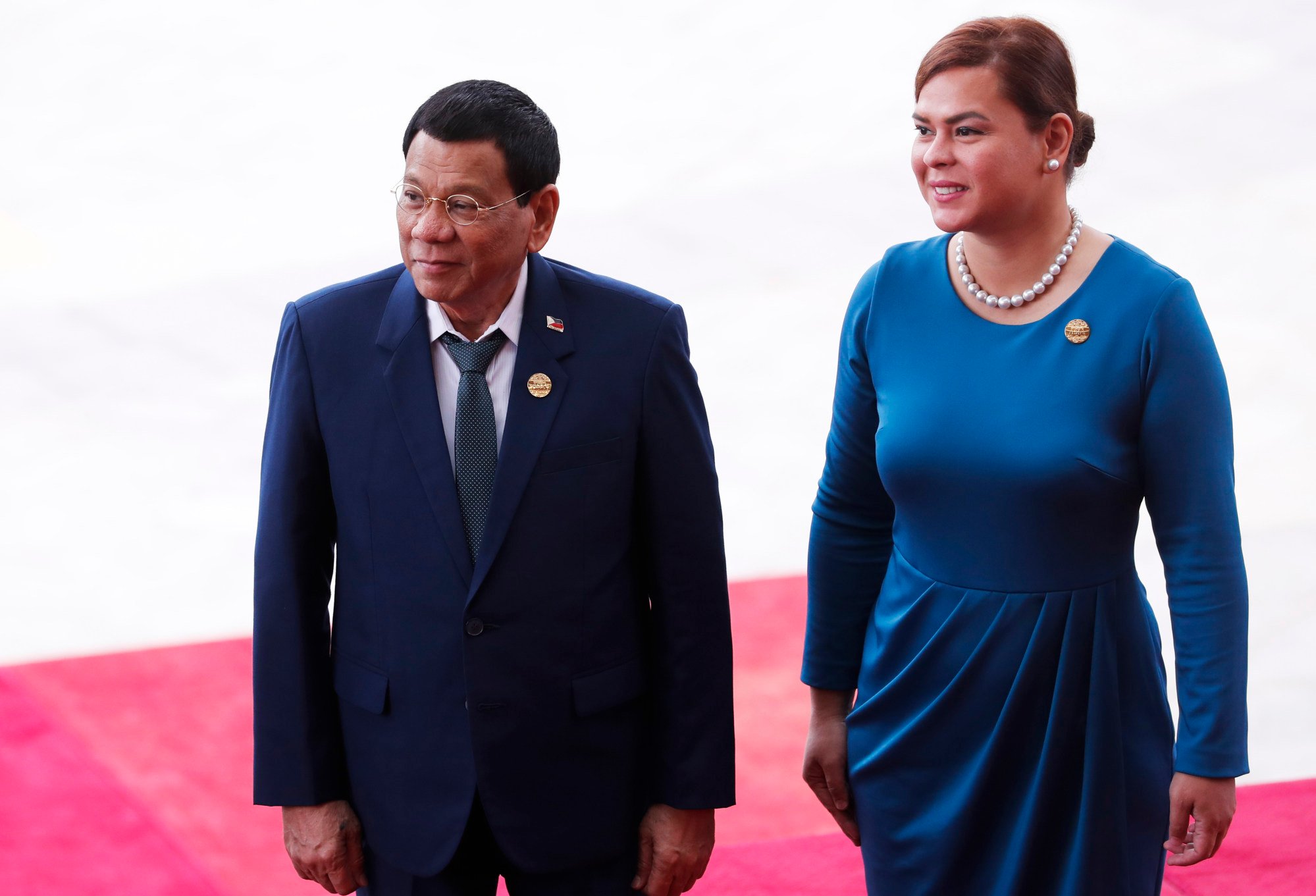
It took Duterte-Carpio five days to craft a reply, which she released in the form of a Facebook video to her 2.2 million followers on Monday. Without sounding contrite, she said it was the first lady’s “right” to feel hurt, before adding that “her personal feelings have nothing to do with my mandate as a government official”.
The vice-president said she would have a “private conversation” with Marcos to determine the next steps, going on to urge the government to focus its efforts on solving inflation, poverty, the “proliferation of illegal drugs”, terrorism and the communist insurgency, as well as providing water and electricity to all.
It triggered an immediate outcry from both her adversaries and Marcos loyalists, who wasted no time in demanding her immediate resignation or expulsion from her role as education secretary in the cabinet.
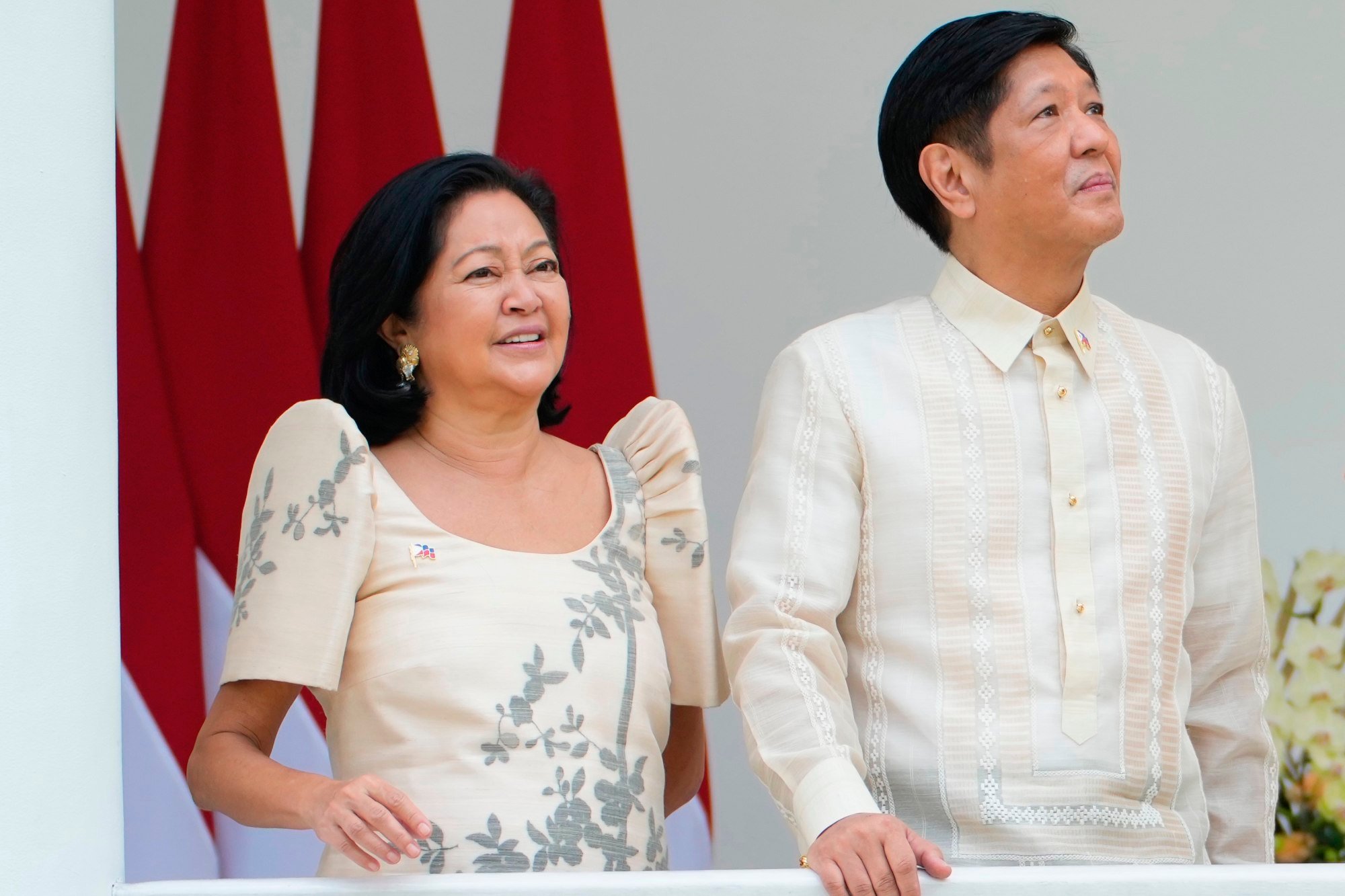
Gentle president, tiger wife
Marcos’ reaction to Duterte-Carpio’s comments was placatory. Instead of vociferously defending his wife’s outburst, he merely said the first lady “is not used to politics”.
“We politicians are used to personal insults; we’re numb to that,” he said. “She didn’t come from a political family, so maybe she still has a lot to learn in letting hurtful, heated words pass.”
Marcos said he was a “lucky husband” because “when she [his wife] hears something bad said against me, she gets very upset. I guess we cannot blame here”.
He added that he saw no reason to remove Duterte-Carpio from her post as education secretary. “If you can no longer perform your tasks, just tell me, we will replace you. If you are incompetent or corrupt, we will remove you. Inday is not like that,” he said, using the vice-president’s nickname to signal their personal closeness.
When you have a gentle president, you should have a tiger wife
Further underscoring the continuation of their working relationship and seemingly brushing off any latent tension, Marcos greeted his vice-president with an affectionate peck on the cheek at a recent event, to show there were no hard feelings.
Yet Araneta-Marcos isn’t as politically naive as her husband claims, according to Chester Cabalza, founding president of the International Development and Security Cooperation think tank in Manila and an anthropology professor at the University of the Philippines in Diliman.
The first lady is not only a shrewd criminal lawyer who once headed a very successful law firm, she also served as Marcos’ campaign manager during his winning bid for the presidency in 2022. What’s more, she was manoeuvring to position their eldest son Sandro, 30, as a potential future president once he reaches the minimum age to run in 10 years, Cabalza said.
“When you have a gentle president, you should have a tiger wife,” Cabalza told This Week in Asia, adding that there was no question that Marcos and his wife “complemented” each other’s personalities.
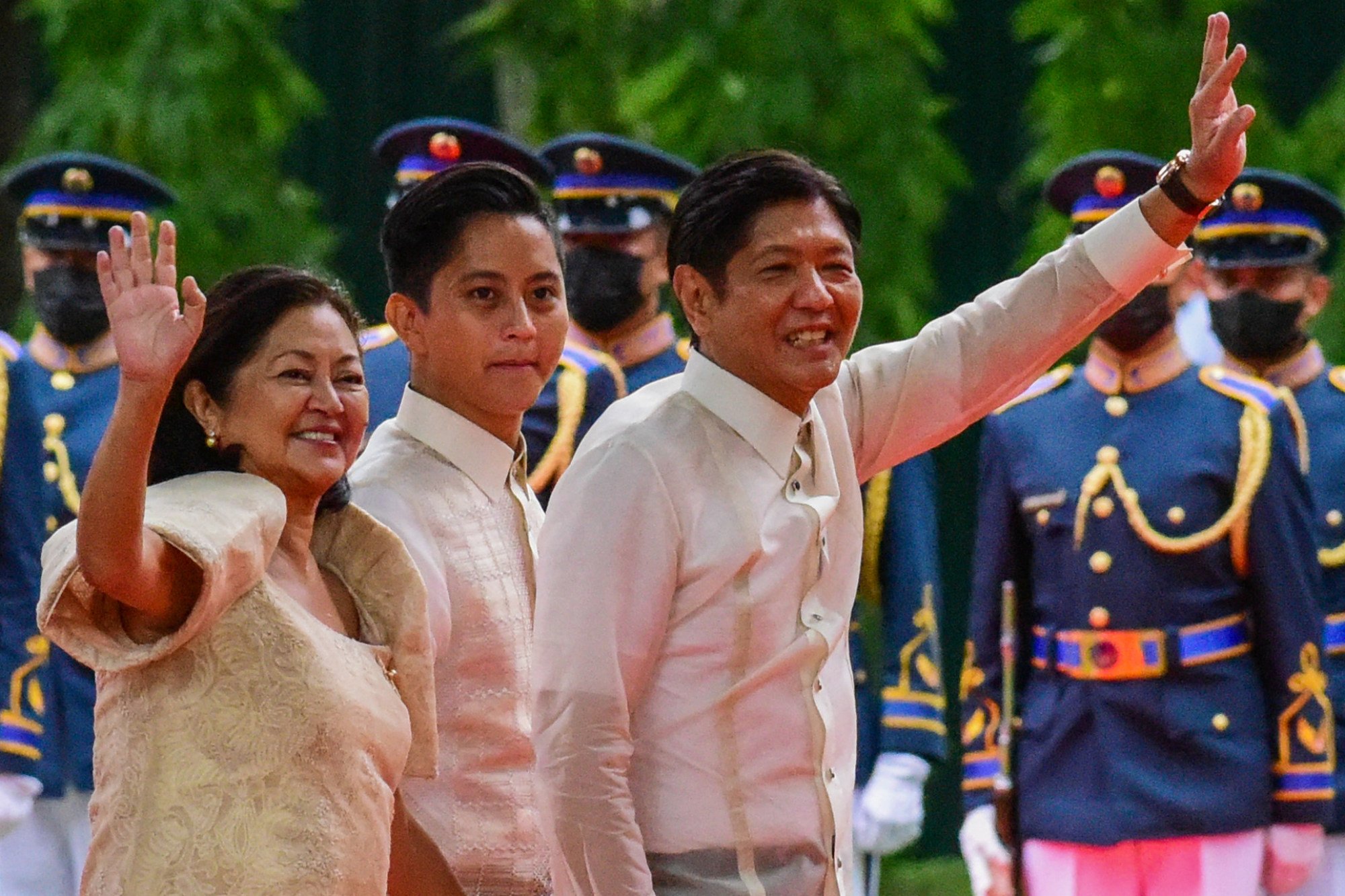
Because Sandro will not be old enough to run for the presidency in 2028, the Marcoses’ cousin House Speaker Martin Romualdez has been suggested as a potential candidate, Cabalza said.
However, he said the Marcos camp had identified Duterte-Caprio, who is highly popular, as a stumbling block to these plans – even as the vice-president’s father and his allies see her as the key to making a political comeback and again pivoting the Philippines towards China. Surveys indicate Duterte-Caprio is currently favourite to win the 2028 presidential polls.
In the meantime, Filipinos have been lapping up the drama, said political risk analyst Ronald Llamas, chairman of Galahad Consulting Agency.
“Filipinos love telenovelas,” he said, referring to television dramas and soap operas. “What’s happening is like our local version of House of Cards and Game of Thrones.”
Marcos Jnr’s wife emerges from shadows as Philippine election race heats up
Marcos Jnr’s wife emerges from shadows as Philippine election race heats up
He said the feud was having a “huge political impact” especially since “there’s a huge political vacuum in Malacanang [the presidential palace], no spokespersons, no real ruling party and ruling coalition, no cabinet scaling up defending or falling on their swords for the president, no apparent political advisers, strategists, operators, et cetera.”
“The first lady appears to be the lone political fulcrum filling the political vacuum, so her interview is, to say the least, pregnant with meaning,” Llamas added.
Historian Manolo Quezon stressed the importance of next year’s midterm polls, which will see all 316 members of the House of Representative go up for re-election, along with 12 of the 24 senators in the Upper House of Congress and all elected local government executives.
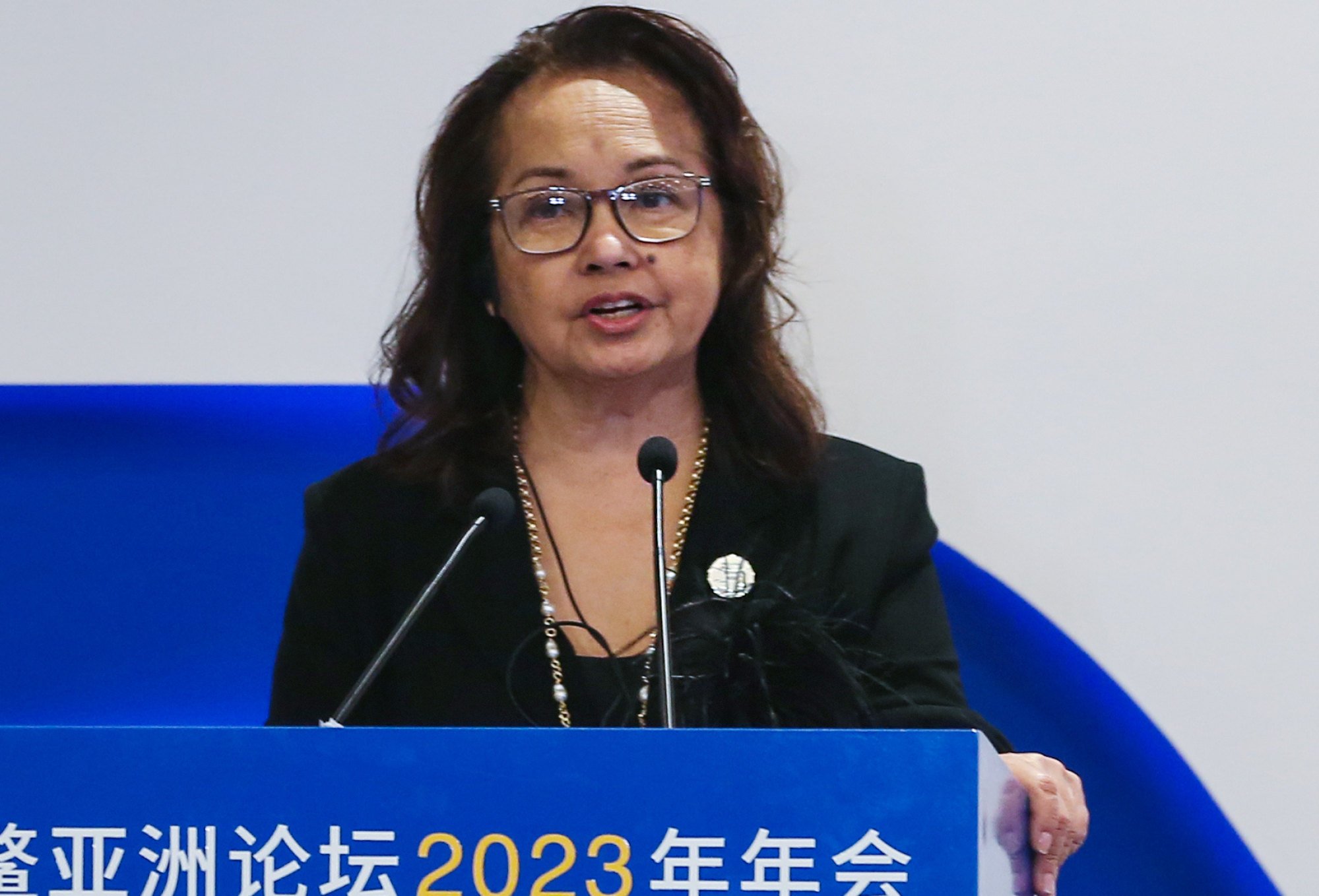
Every Philippine presidency “is born with an electoral mandate and in its midterms faces a plebiscite which can leave it a lame duck [if it loses],” he said.
For presidents whose chosen candidates fail to clinch a majority at the midterms, this means they will often find it difficult to pass legislation or budgets, introduce new taxes or have their anointed successor elected.
That was what happened to President Gloria Macapagal Arroyo, with her 2007 midterm defeat in the Senate followed by her candidate not winning the presidential nomination in 2010. She was later arrested and detained for five years on election fraud charges.
US, China influence
Allegations of the feud between the two political camps being fuelled by foreign interference have run rife on Philippine social media.
But security analyst Rommel Banlaoi told This Week in Asia: “China has nothing to do with the feud, which is largely domestic and deeply personal between Sara and Liza.”
Banlaoi, who serves as director of the Centre for Intelligence and National Security Studies and is an adjunct research professor at the National Institute for South China Sea Studies in Hainan, China, said “the US will benefit” if the feud were to worsen as “a nation divided can easily be ruled. Divide and rule.”
“Philippine domestic politics is now heavily influenced by US-China great power rivalries. Both powers have interest in seeing the outcome of the 2025 elections work in their favour,” he said.
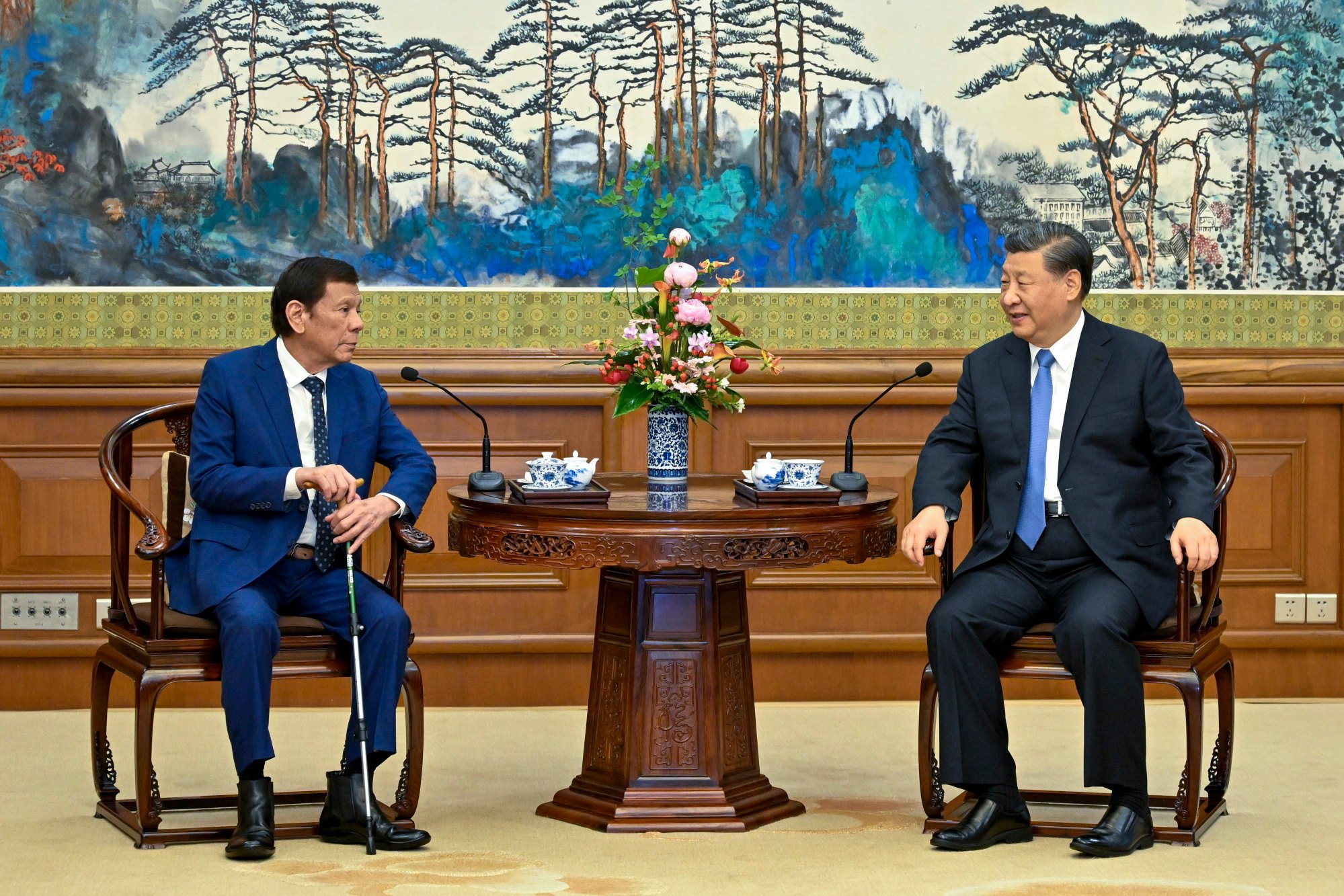
Security analyst Cabalza disagreed with Banlaoi’s assessment, however.
“China will leverage the feud in next year’s midterm polls when those opposed to Marcos try to capture both houses of Congress,” he said. “Their objective is to make Sara [Duterte-Carpio] president in 2028.”
The feud is but a symptom of “an existential issue” that has gone unspoken between the two camps for months, Cabalza said, adding that Duterte’s camp feels his daughter was unfairly treated in the division of post-election spoils.
Marcos declined to give Duterte-Caprio the post of defence secretary and recently halved the amount of confidential funds she had requested.
Activists slam Sino-US rivalry in Philippines’ South China Sea maritime zone
Activists slam Sino-US rivalry in Philippines’ South China Sea maritime zone
“The lines have been drawn much earlier,” said Llamas, who once observed power politics up close when he served as presidential adviser for political affairs to the late President Benigno Aquino III.
He said the outcome of the feud carries serious foreign policy implications. “If the Dutertes are destroyed, it will of course benefit the Americans. If Marcos falls, it will definitely benefit China. It depends on who will be the last dynasty standing,” Llamas said.


